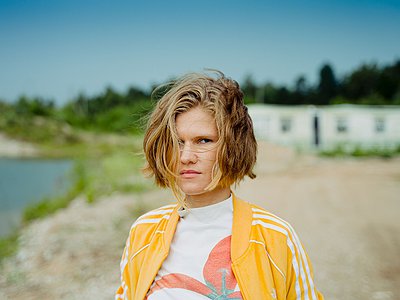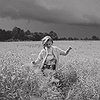Name: Maarja Nuut
Occupation: Singer, violinist, producer, composer
Nationality: Estonian
Current release: Maarja Nuut's third full-length album Hinged is out via her own bandcamp store. [As an aside, you can read our Rafael Anton Irisarri interview, who mastered the album.]
Recommendations: For reading - “Entangled Life” by Merlin Sheldrake; For listening - “Organ”, a wonderful album from Maria Faust Sacrum Facere (and heartily recommend to check out Maria’s other works as well)
If you enjoyed this interview with Maarja Nuut, visit her official website. She is also on Facebook and Instagram.
When did you start writing/producing music - and what or who were your early passions and influences? What was it about music and/or sound that drew you to it?
I wrote my first little song at the age of five I think. It was for our rabbit Pilla-Palla. After that it took about fifteen years to feel the need to express myself in a more personal way, through sounds that would not be limited to interpreting someone’s score.
I’ve been drawn to sounds as long as I can remember, it’s really hard to say what was it exactly. But I remember myself always lost in daydreaming when hearing music that sounded captivating so I guess it’s that magic feeling I’ve been chasing ever since.
My mother was a choir conductor, I was introduced to all kinds of different music from an early age on and started studying violin at the age of seven. I always enjoyed listening to various artists, loved the raw energy of Led Zeppelin and weird tonalities of Indian ragas, remember vividly listening to Björk’s Homogenic for at least hundred times when it came out, Kula Shaker, Mike Oldfield’s Tubular Bells (laughs), Brahms piano concerts, folk music and everything in between.
For most artists, originality is preceded by a phase of learning and, often, emulating others. What was this like for you: How would you describe your own development as an artist and the transition towards your own voice?
With each new record I feel like it’s the most personal one … maybe because I get a little closer to my own voice? But when I change as a person and look for ways to reflect that through music, I seem to always be back in the beginning - lost and thirsty for something I don’t know yet. Having finished Hinged a few months ago I already feel pretty tormented about what’s next.
Regarding emulating. I think it’s an important skill to acquire if you want to know something in depth. My folk music studies were all about emulating - transcribing every little ornament, microtone and even mistake, then learning to play the same way, but then after a certain period of nerdy fiddling I felt something is missing … I didn’t want to imitate someone’s out-of-context instantanious expression (the context in which these people were archived in the first half of the 20th century), I wanted to understand the nature of their musical language so that I could start speaking in my own way.
And then we artists are often faced with all those comparisons and you sometimes think whether the music journalists are blinded by their listening habits or do I really sound so opaque?
I’ve been compared to very different artists throughout years, to some I relate more than others. Funnily, that’s also how I’ve discovered a lot of music - being compared to someone or something and then looking it up. The way we perceive and describe music is a matter of our imagination and listening experience, some people delve into deeper layers and the comparisons they draw reflect that as well.
I used to be very careful when I perceived someone’s influences on my work. I put the piece aside, sometimes for months or even longer ... until it came back to me, slightly different and recognizably mine.
At the same time this harsh filtering could also lead to excessive critisism and hinder playfulness … It’s important not to get stuck with obsessing over creating something nobody ever heard before. That is unrealistic. We’re all different and as long as we’re honest to ourselves, express what feels important at that point of time, in a way that feels relevant, we’re unique. But it’s not easy to get to the bottom of that.
How do you feel your sense of identity influences your creativity?
Identity as such includes many aspects of the self and I don’t see it as a static concept either.
The question of ethnicity - if and how I sense it, in which ways should I reflect it in my creative work - was something I often faced when learning traditional music and working with people who devoted their lives to researching and preserving traditions. Or if I was interviewed on a topic - what makes your music Estonian … what is unique about it ... I often felt perplexed and tried to fit myself into some framework but it never felt quite right.
A forced identity could make one feel stuck … On the other hand, the older you get the more you learn about yourself, where you come from and where you are heading to. I feel more and more freedom in expressing myself in different ways and hope to keep exploring.
I never liked to associate myself with only a certain part of the music scene or social group either, it’s important for me to feel free which can sometimes lead to not fitting anywhere. Musically, I never change my sound for the sake of it. It’s just what happens on the way.
I’m certainly influenced by the surrounding environment and landscapes ... observing a place and my relation to it. For example, both creativity and sense of identity were greatly influenced by a place I spent the most time when creating album Hinged - my late grandmother’s homestead.
What were your main creative challenges in the beginning and how have they changed over time?
In the very beginning it was a lot about finding courage to just play freely and improvise.
I studied classical violin at a boarding school for 12 years, then continued in the Estonian Academy of Music and Theatre for two years until I took a year off and went to New Dehli to study Hindustani music. That was a turning point but the “academic baggage” which (alongside many good things) included the fear of making mistakes or not being good enough, haunted me for years to come.
When I started my solo project which back then meant mainly arranging traditional music and spicing it with a little bit of live-looping the main questions were how to break free from playing folk music in a so-called unaltered and therefore lifeless form (as it wasn’t a living tradition anymore), and how to implement looping in organic and non-static ways. As I started composing my own pieces new question arose - what is my sound, how to recognize it?
The challenges of recent years have largely been related to seeking new means of expression and blending electronic sounds with acoustic instrumentation in a way that complements both. The next creative challenge is to do with writing a choral song cycle.
As creative goals and technical abilities change, so does the need for different tools of expression, be it instruments, software tools or recording equipment. Can you describe this path for you, starting from your first studio/first instrument? What motivated some of the choices you made in terms of instruments/tools/equipment over the years?
My first and only instrument for a long time was the violin. At one point in my twenties I played music in a theatre show and was asked to sing there too. That felt just impossibly terrifying so the only way I could imagine handling that was to sing while playing violin, and so began the bumpy journey of using my voice.
For many years my technical knowledge was limited to using different loopers and some simple synths but then came a moment when I felt stuck and trapped in that frame. It was in spring 2019, I was tired of flying around, felt I wasn’t developing as an artist and started thinking about how to proceed (if at all). A year before my partner had suggested I should get acquainted with modulars and I was like: What? Are you nuts? I can’t even set up a project in a DAW! A few months later, the first Eurorack modules arrived and waited for me in the corner of the studio until that weird spring when I thought, now or never.
Since then it’s been a hugely inspiring process, falling in love with the seemingly infinite possibilities of modular patching, experimenting with different ways of recording and manipulating vocals or composing techniques, also just jamming a lot ... It’s not like it was easy or that I had the answers to the questions hanging in the air. But it felt good to be exploring and I mean one can really create wondrous sounds with these little instruments. Simply by sending voltages here and there you might hear something that feels really inexplicable yet organic.
Also, I really love the tactility of modulars, probably because of my background as a violinist.
Have there been technologies or instruments which have profoundly changed or even questioned the way you make music?
Yes. Firstly, it was the slightly faulty Mobius looper back in 2015, the peculiarities of that software shaped my looping style. Secondly, a custom-made MaxMSP looper that aimed to combine Mobius' ingenious mistakes with Ableton's practicality and was a big upgrade in flexibility. Thirdly, my voice and modulars.
Collaborations can take on many forms. What role do they play in your approach and what are your preferred ways of engaging with other creatives through, for example, file sharing, jamming or just talking about ideas?
Collaborations can be good way to expand an artist’s musical worldview. I not only learn about other musicians (always interesting) but often discover something new or hidden in myself that I then maybe want to further explore.
Sometimes jamming is best. But my most preferred way would generally be file sharing - in order to not feel the pressure of doing something over time.



